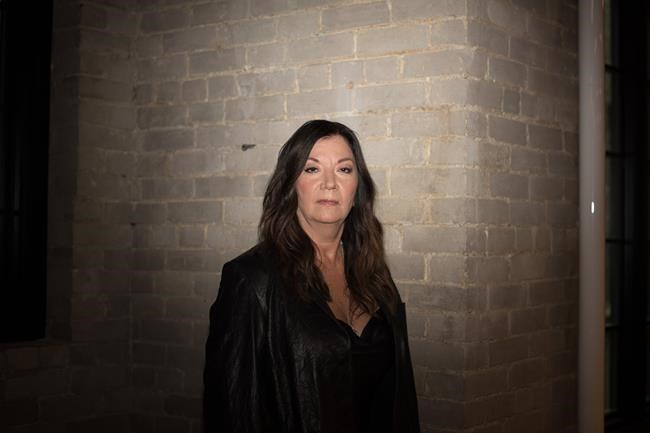
Marie Clements, creator of the film "Bones of Crows," poses for a photograph during the Toronto International Film Festival on Sunday, Sept. 11, 2022. THE CANADIAN PRESS/Tijana Martin
June 01, 2023 - 3:00 AM
TORONTO - Reminders of Canada’s shameful treatment of Indigenous Peoples were constant as Marie Clements shot parts of her sweeping drama “Bones of Crows” at a former residential school, where hundreds of suspected graves were discovered two years ago.
The writer/director says fictional scenes depicting abuse at a residential school were shot at the Kamloops, B.C., facility where the Tk'emlups te Secwepemc First Nation said it had found 215 suspected unmarked graves in May 2021.
"We were literally shooting in the residential school and looking out the windows and seeing the memorial site," Clements said in an interview at the Toronto International Film Festival in September, when the film premiered.
"In some ways that made it even more real, you know. It made it really (important) that we had to do it and we had to do it right."
Similar findings by other First Nations followed the Kamloops discovery, igniting waves of grief and anger across the country and calls for the religious and government authorities responsible to be held accountable.
It was a grim reminder that thisdeplorable history continues to reverberate through subsequent generations, Clements said last week by phone from her home on Galiano Island, near Vancouver.
"These discoveries are so present and I think it really just underlines that it's still an alive thing that people are processing," Clements said as the film prepared to hit theatres Friday.
Clements said she bracedfor the possibility of having to relocate the October 2021 shoot, but found the band council and community leaders "very supportive of us still coming."
"I think their attitude around it was that they wanted people to know the truth," said the Vancouver-born Dene/Métis filmmaker.
"Bones of Crows” recounts decades of systemic abuse against Indigenous Peoples as seen through the eyes of a Cree woman played by Secwépemc actress Grace Dove, whose character is haunted by painful memories until she begins to confront her abusers.
Aline Spears’ story begins in 1930s Manitoba, in a happy music-filled household suddenly shattered when she and her siblings are forced into residential school and then separated. As an adult, Aline becomes a code-talker in the Second World War, marries and has a family, but increasingly finds it impossible to ignore her traumatic past and ongoing systemic racism.
Dove said she relished the chance to embody Aline’s searing pain and resilience, a challenge that proved “harder than I ever imagined, and more rewarding than I ever thought."
Dove said she went into the shoot knowing she “was not going to be the same person coming out.”
"There was such a hesitation at the beginning after reading the full script because I knew immediately what it was going to take for me to go there fully, to give my heart and my spirit and my craft to this script,” Dove said at TIFF alongside co-star Alyssa Wapanatâhk.
“I honestly had to know in my heart that this would never be easy, and that this was going to be extremely hard. But I was willing to commit to that and give a piece of me.”
Wapanatâhk, who plays Aline’s younger sister Perseverance, noted her character "goes down a very, very tough path."
"Perseverance was a sprightly little dancing girl. She had dreams. She had a spark. And she was feisty,” said Wapanatâhk.
“I don't think any of that went away in her adult life, but it was definitely pushed down by people and she wasn't able to live her dreams."
The largely Indigenous cast also includes Graham Greene, Lorne Cardinal and a cameo by veteran documentary maker Alanis Obomsawin.
Clements said it so happened that the days spent at the Kamloops school coincided with Prime Minister Justin Trudeau meeting with the Tk'emlúps te Secwe?pemc Nation to apologize for failing to meet them on the first National Day for Truth and Reconciliation.
Trudeau spent part of Sept. 30, 2021 flying to Tofino, B.C., to vacation with his family, drawing widespread criticism for skipping the invitation on a day meant to honour the Indigenous children sent to government-funded, church-run residential schools where thousands died.
Clements said many people still don't seem to grasp the scope of this legacy, and it's important to continue talking and investigating, no matter how painful.
"We have to look at our part in things that are unpleasant, and really address it and have those conversations," she said.
"It's hard to look at, you know, any country or any history that's unpleasant and go, 'We were a part of that.' But I do think whether you're actively a part of it, or whether you just ignore it, or whether you just turn the other way, it's all inaction."
Dove said the burden has been especially heavy for Indigenous communities often tasked with leading this reckoning, as well as efforts to heal. She hoped that "Bones of Crows" could ease some of that strain by sparking fresh conversation.
“Especially for Indigenous Peoples, this is very hard work. And watching this is going to bring up a lot of emotion. I hope that we hold our loved ones very close and close together and support our communities,” she said.
“For non-Indigenous folks, I hope that they start a conversation and they talk to three people (about this) and really, really look into the true history of so-called Canada.”
This report by The Canadian Press was first published May 31, 2023.
News from © The Canadian Press, 2023